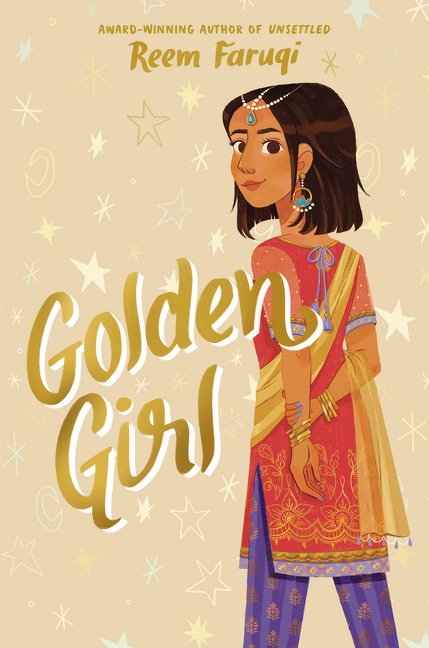Meet-the-Author Recording with Reem Faruqi
Golden Girl |
Reem Faruqi introduces and shares some of the backstory for creating Golden Girl.
Translate this transcript in the header View this transcript Dark mode on/off
Reem Faruqi: Hi, my name is Reem Faruqi and I am the middle grade novel in verse author of Golden Girl.
A lot of the books that I write are based on real experiences that either happen to me or other people. So Aafiyah Qamar has a bad habit, and it's called a bad habit, but it's actually something more serious. It's called Kleptomania. And it can be triggered by certain situations.
And I remember having a friend close to me who would take things, and I just remember being on the other side of that, being sort of shocked, sad, betrayed for a lot of emotions that went in with having someone so close to you take your things behind your back. So that was really hard.
Then when I thought about writing a story, I sort of thought, "what if I wrote this story from that person's point of view?" And I did a lot of research, read a lot, and I wrote about the story told from her point of view where she has almost itchy fingers where she loves to borrow. She knows what she's doing is wrong, but it's just so hard to stop.
And her father being taken away actually happened to a family member that I knew of who was detained. And I remember the sadness when you have a family member who's detained for something they didn't do. So that was a bit hard to sort of witness on the other side.
I do this thing, which I don't know if other people do it. I'll write about the people, sounds weird, so for example, with Nora in Unsettled, I have three brothers and one of them called Owais. I just changed the name to one of my brothers. And then at the very end of the story, I replaced the name.
So with this story, the mom and the dad, they might be a lot like somebody I know, or my mom or my dad. The father, Abba actually is a lot like my father. He loves to play tennis. And when he would have, so we lived in this house with stairs, and whenever somebody would run out of toilet paper, he'd be like, "Touchdown." We'd throw the toilet paper up to the other person before spiking it down on the floor. You know how when you see American football, sometimes they catch and they spike the ball on the floor when something happens like a good touchdown.
So these are the experiences, or the characters are actually mostly based on real people that I know. And then at the end of the book, I'll go back and I'll change all the names and something, so it's not so obvious that they're real people.
Few are anything like me and you love nonfiction. One of my daughters does too. We love the weird but true facts. And as I wrote this book, I had a lot of weird but true facts from National Geographic. There's like a series, the books are yellow, and you can usually get them in most libraries.
They have the coolest facts. So for example, I put one in the book, it says, "Weird, but true fact number seven. Did you know that only female mosquitoes bite?" The facts that I wove into the book usually go with something that happened. So there's a part when Aafiyah feels really embarrassed around her family for something she did. And she thought, "Oh my gosh, what if my father was here? What would he have said?" And then I put, "Weird but true fact. Did you know that cockroaches can recognize their family members?" And it's such a weird fact, but I hope that it brings humor to the story and it makes you go, "Ugh," or, "that's funny," or "that's interesting," because I think real knowledge is just so fascinating. So I try to weave that in as much as possible.
I hope when the reader reads it, they can feel inspired to pick up the weird but true facts, or maybe even research them because I was fascinated by them.
Sometimes things like kleptomania, I have an author's note and resources in the back, when Aafiyah would be stressed out, it would trigger her. So if somebody does have a problem like that, really try to get help and not be embarrassed about it.
Zana's room. Look what Selma gave me. She wasn't using it. The benefit to having three older sisters, all their stuff. The benefit to having a two-year-old brother, not much. Zana opens a purple case, a shiny mirror, followed by shimmery circles of eyeshadow that close together with a snap, sound of hope. Zana puts the eyeshadow palette in her drawer, where old phone chargers and gum wrappers kiss.
Second grade. When I was in second grade, we learned about Johnny Appleseed. Learned he had itchy feet, which meant he loved to travel. I must have itchy fingers because I love to borrow.
Homework. When Zana runs down to get her binder from the kitchen table, I have 30 seconds on my own. Thirty seconds is enough. I break up the kissing cords and gum wrappers, slide my hand around, put the palette in the hollow cavity of my book bag.
Problem. I like the feeling of something new in my hands. I like the feeling of something new in my hands that's not mine.
Bathroom mirror at home. This eyeshadow makes me look creepy."
This Meet-the-Author Recording with Reem Faruqi was exclusively created in December 2022 by TeachingBooks with thanks to HarperCollins.



